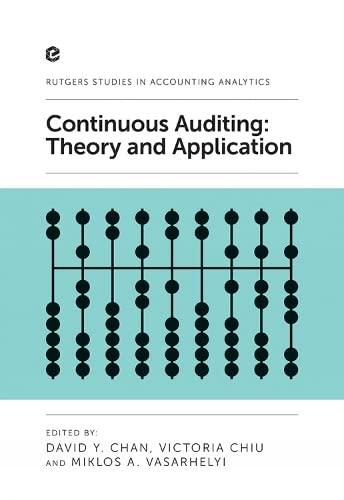Question
A retailer had a beginning merchandise inventory of $30,000, an ending merchandise inventory of $40,000, sales of $450,000, and a cost of goods sold of
A retailer had a beginning merchandise inventory of $30,000, an ending merchandise inventory of $40,000, sales of $450,000, and a cost of goods sold of $300,000. The retailers daily sales in inventory was:
Select one:
a.42.6 days
b.36.5 days
c.31.5 days
d.45.3 days
e.48.7 days
A company reported a gross profit margin of 40% and net sales of $364,500 for the current year. Calculate the cost of goods sold using the gross profit method.
Select one:
a.$218,525
b.$219,190
c.$219,687
d.$218,700
e.$219,015
Source documents such as purchase orders and cancelled cheques are destroyed after a month as there is no space to store them. Which internal control activity has been violated?
Select one:
a.physical and IT controls
b.human resource controls
c.documentation procedures
d.segregation of duties
e.establishment of responsibility
f.independent checks of performance
Which the following would result in a journal entry after preparing the bank reconciliation?
Select one:
a.EFT payment from customer on account.
b.A $250 outstanding cheque was issued by the company but hasnt yet cleared the chequing account.
c.The company deposited $650 at the bank but the deposit wasnt yet recorded in the bank statement.
d.The bank made a mistake. A $650 company deposit was recorded as $560 in the bank statement.
The following asset balances were as follows: Cash, $9,650; Accounts Receivable, $21,600; and Allowance for Doubtful Accounts, $5,540. The next day, you record the collection of a customer account for $2,010 that had been written off six months earlier. Record the balances of each of these accounts after the customer collection.
Select one:
a.Cash, $9,600; Accounts Receivable, $21,600; Allowance for Doubtful Accounts, $7,550
b.Cash, $9,600; Accounts Receivable, $23,610; Allowance for Doubtful Accounts, $5,540
c.Cash, $11,660; Accounts Receivable, $23,610; Allowance for Doubtful Accounts, $5,540
d.Cash, $11,660; Accounts Receivable, $21,600; Allowance for Doubtful Accounts, $7,550
e.Cash, $9,600; Accounts Receivable, $21,600; Allowance for Doubtful Accounts, $5,540
Before year end adjusting entries, Accounts Receivable had a $215,000 balance. The Allowance for Doubtful Accounts had $5,640 credit balance. Based on % of receivables method, $25,600 of year-end receivables are estimated to be uncollectible. After the year end adjusting entry for bad debt expense, what are the balances in the following accounts?
Select one:
a.Bad Debt Expense, $19,960 and Allowance for Doubtful Accounts, $19,960
b.Bad Debt Expense, $25,600 and Allowance for Doubtful Accounts, $25,600
c.Bad Debt Expense, $19,960 and Allowance for Doubtful Accounts, $25,600
d.Bad Debt Expense, $31,240 and Allowance for Doubtful Accounts, $31,240
e.Debt Expense, $25,600 and Allowance for Doubtful Accounts, $31,240
Step by Step Solution
There are 3 Steps involved in it
Step: 1

Get Instant Access to Expert-Tailored Solutions
See step-by-step solutions with expert insights and AI powered tools for academic success
Step: 2

Step: 3

Ace Your Homework with AI
Get the answers you need in no time with our AI-driven, step-by-step assistance
Get Started


